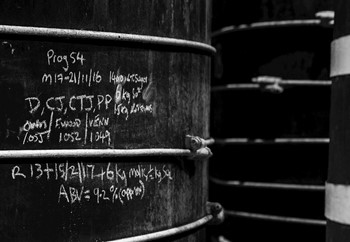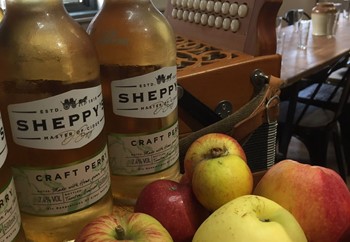August 2023. Question to Louisa. - I live in Suffolk; why is our cider here, and from Norfolk so much more dry and sharp than yours in the West? I prefer yours I must say. Obviously, Apple varieties will be a factor, but I’m sure not the only one..?
In the west country, we largely produce our ciders from traditional cider fruit. In your area, many ciders are made with much larger quantities, or even exclusively, dessert fruit, which have different qualities. While your ciders may or may not be drier, they can be sharper as a result of this.
July 2023. Question to Louisa - Is 2023 going to be a good year for cider? Do you think the changing climate will make things better or harder?
Now that we’ve had some rain, we hope to have a decent crop; not the best, but better than last year. If we don’t get deluged from now on, the fruit quality should be good and the cider will follow.
I feel that climate change will make things harder, as the trees themselves cope with extremes and as the nature around them tries to cope. Pollination relies very heavily on wild insects of all sorts, and all the research suggests that insects have declined badly. Our orchards, boundaries and hedges are quite diverse and have, so far, maintained a high insect population. I wish I could say I feel very positive about the future, but, as someone who is passionate about nature and our surroundings, I do feel worried.
June 2023 .Question to Louisa - Do the apple trees have a lifespan as such? Are they more productive at a certain age?
Our oldest trees are my absolute favourites. They are beautiful old standard trees planted to mark the birth of David’s father Richard in 1927. They are approaching 100 years, which is about the limit of life for most apple trees, so declining in productivity, but, at this age, the most fantastic wildlife habitat with their craggy trunks and holes and hollows. Standard trees probably take about 12 years to begin to be properly productive. Bush trees (branching at about 3 feet) are a little quicker. Like all things, the middle years when the trees reach maximum size and strength are the most productive, but productivity in apples relies heavily on care, particularly on pruning.
May 2023. Question to Louisa - Is climate change factored into your long-term planning? Are there apple varieties better suited to warmer temperatures e.g. French varieties that could be planted?
Climate change presents several risk factors for apple trees. One is wet Winters, as apple trees don’t like sitting in water and another is prolonged periods of drought. We have done our best to manage wet Winters by making sure to install really good drainage before planting any new orchards, but our older orchards do get wet and we have suffered some tree loss through water-logging, which we have found impacts our “teenage” trees worst. Drought is more difficult. Last year we saw some tree stress in the drought and heatwave, and I noticed mistletoe dying in the trees for the first time. Outwardly, the trees seem to have made a good recovery, but they may suffer if this becomes an annual challenge. With trees covering 90 acres (and there are many much larger orchards than ours), irrigation can’t be a solution and would only add to expected national long-term water shortage.
One thing which apples must have is a prolonged period of cold (below about 5 degrees C) during their winter dormancy to ensure cropping, and I often wonder whether this is going to be gradually eroded, but it doesn’t seem to have been a problem yet. I am not aware that there are any varieties of apples which are particularly suited to these changes or that anything is being invested in this particular species research, but I have no doubt there may be something out there if we look for it.
April 2023. This month's question to David - More tips for making cider at home?
- Make sure you have plenty of apples to juice.
- To make a demijohn of cider you will generally need around 10kg of apples to make just over 4.5 litres of liquid.
- If you are smashing your apples rather than juicing you may need a few more apples as you won't be able to extract as much liquid.
March 2023. This month's question to David -What are you best tips for making cider at home?
- Don't stick to one apple variety.
- Our best ciders are created from a blend of apples that create different flavours and aromas.
- A mixture of sweet, aromatic and interesting apples often work best.
- Trial and error is key, mixing different apples can lead to some interesting discoveries.
February 2023. This month’s question to David - Is cider normally fizzy or flat?
- There are two main ways in which cider is presented: Still and Sparking.
- The fermentation process is generally the same during which the yeast converts the natural sugars into alcohol.
- During this process, carbon dioxide gas is given off. To make still cider, the gas is allowed to exit the mixture, resulting in no fizz.
- One way to creating sparkling cider is when carbon dioxide is added in, known as forced carbonation causing bubbles.
January 2023. Did you know that all Sheppy's ciders are vegan.
- Fun fact: the word 'wassail' comes from old Norse and Old English, meaning 'be in good health'.
- Did you know...Sheppy's ciders are made from our own apples grown here at Three Bridges Farm. We also support local traditional apple growers to supplement our own crop of about 1,000 tonnes.
- Did you know... We believe in letting nature do its own work, after harvesting the apples we lt them ferment using only natural wild yeast found in the apple’s skins.
December 2022. This month’s question to David - Are your ciders a mixture if different apple varieties or one?
- We have 30 varieties of cider apples at Three Bridges Farm which are used across our range of ciders.
- Lots of our ciders use a blend of apple varieties like Sheppy's Vintage Reserve Cider which use quality Bittersweet apples such as Chisel Jersey, Yarlington Mill, Stoke Red and Tremlett's Bitter.
- Blending different varieties of apples is what gives cider character, flavour, mouthfeel and crispness.
November 2022. This month’s question to David - Do you have an apple that tastes a bit like champagne?
- The closest cider apple is Kingston Black, as it has a unique character of mild bitterness with medium acidity, and very good naturally occurring fermentable sugars.
- To get a true bottle fermented cider you need to produce the cider in the champagne’s method.
- This involves in-bottle fermentation at the bottle regularly and disgorging the sediment at the end.
October 2022. This month’s question to David -How has the drought affected the apple harvest this year?
- The crop is mixed; some varieties have fared well such as Harry masters and Michelin and others not so well such as Dabinett and Kingston Black.
- The apples are generally smaller, and some have fallen too early. However, one plus is the sugar levels are higher than usual, which means they'll still deliver the same award-winning quality Sheppy's is renowned for.
September 2022. Sustainable Sheppy's
- Sheppy's is leading by example when it comes to taking care of the planet and we ensure that the production process from orchard to bottle is as sustainable as possible. Whether it's the pumice created from the harvest which is used to feed cattle, or cuttings form the trees which we turned into flooring for the children's play are nothing goes to waste.
- In 2007 we installed a WET (Wetland Ecosystem treatment) system for the management of effluents from cider production. Sculpted into our impervious clay sub-soil and planted with thousands of willows and marginal plants, the series of ponds is designed to absorb and degrade the effluents in a natural way.
- Did you know...Sustainability is important to us here at Sheppy's we have multiple practices in place to improve our farming environment. One way we do this is with beehives across the farm to help with pollination. We value the role wild bees and honeybees play not only in our business, but in human life. Our bee hives are specifically placed throughout the farm where pollination is encouraged.
August 2022. This month’s question to David - What apple varieties do you grow at Sheppy's Cider Farm?
- We have 90 acres of cider orchards, producing 30 different apple varieties from Kingston Black, Yarlington Mill, Dabinett, Stroke Red, Tremlett's Bitter and many more.
July 2022. This month’s question to David - As managing director of Sheppy's Cider do you have a favourite apple variety?
- The Redstreak apple variety is one of my favourites, so being able to introduce our Redstreak cider in 2022, which has a wonderfully refreshing flavour, was a real joy. However, the skill in making the finest cider is being able to blend different varieties to produce both character, flavour, mouthfeel, and crispness.
- To do this you need a good mix of cider apples. My favourites for blending would have to be Dabinett, Chisel Jersey and Yarlington Mill, with a few Browns apples to lighten the bitterness and increase the crispness.
June 2022. This month’s question to David - Do you use only apple juice in your cider or are their other ingredients?
- Sheppy's ciders are all made just using apple juice from our apples grown here at Three Bridges Farm. From Dabinett to the revered bittersharp Kingston Black apple, we grow over 30 varieties of cider apples here on our farm.
- We press our apples at seasonal harvest with no need to concentrate our juice or to press from chill-stored apples. we believe this is the most natural and environmentally sensitive way of producing fine traditional ciders.
- All of our fruit ciders have real fruit additions such as raspberry or Blackberry and elderflower to compliment the apple and create a perfect balance of sweetness.
May 2022. This month’s question to David - Do you plan to introduce a blackberry or orange flavoured cider.
and would the acidity in the letter work?
- Citrus flavours are an interesting addition to cider and the acidity would balance out and
compliment some sweeter ciders, however in our opinion it's all about balance and letting the apple.
and additional flavour complement each other rather than overpower. Watch this space!
- We already have blackberry flavours with a Blackberry and Elderflower cider as part of our Bag in Box
range.
- As with our other flavoured ciders the apple is the star of the show, and Sheppy's Blackberry and
Elderflower bag in Box is a delicious combination of dessert apple cider with blackberry juice and
elderflower infusion.
April 2022. This month’s question to David - What weather makes for a good years of cider making?
- A cold winter whist the trees are dormant.
- A warm Spring and early Summer to help the trees blossom to encourage a good pollination and tree
growth.
- A mixture of light to moderate rain and sun in August and early September, which is what the apples
need to swell, as well as raise the sugar content before harvest.
March 2022. This month’s question to David - What's a great dry cider too use in cooking?
- A good quality cider is essential, 6-7% VOL is ideal.
- Sheppy's farmhouse dry cider is perfect for fish, chicken, and vegetarian dishes.





